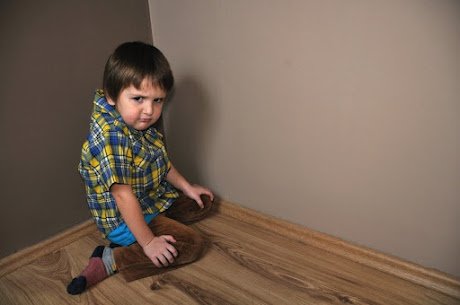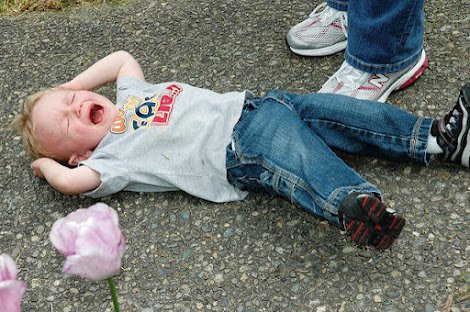
You often mention disciplining children so they behave what is your advice for making them behave without resorting to corporal punishment well first of all it depends on what you mean by corporal punishment.

Timeout could be regarded as corporal punishment. it also depends very much on the age of the child let's say a two-year-old well in a book by the way I have read a chapter in there called don't let your children do anything that makes you dislike them and the reason that I studied a chapter about that is because people who let their children do things that make them dislike them end up disliking them and because there's a huge power differential generally speaking between adults and children.

If you end up disliking your children because they're not behaving well they're behaving disgracefully say or their challenging your position in the Authority hierarchy to regularly something you won't put up with by the way even if you think you will it's necessary to get your disciplinary routine straight so the first thing I would say is figure out what the rules are there shouldn't be too many for two-year-olds basically they have to know what no means and they also have to learn as they approach three not to kick ,hit, bite or steal. Essentially now it's easy to train a two-year-old but no means you can actually start with a child that's only 13 months old a child that can cry let's say that or that can crawl let's say that you have a child is starting to crawl and wants to explore the house so the first thing you do if you have any sense is try to get rid of most things that the child could cause a tremendous amount of trouble with - to the things or to the child so that it's reasonably safe and then the child is going to want to crawl around and get into everything and so but maybe there are things you don't want him or her to get into like maybe there's a a tablecloth and on top of the tablecloth there's a plant or maybe there's some plants on the floor and when the child is crawling and goes off to do something that he or she shouldn't you can grab his leg and you know gently but firmly and say no and the child will keep trying to move forward because they're stubborn little blighters and you can continue to say no and if you persist with saying no then the child will eventually give up and sort of go limp now and often the child will cry when you do that and of course that might make you feel guilty but what that means is that you've effectively brought the behavior to a halt and if you do that ten times you've got to watch your child and don't stop them from exploring things that they need to explore and you want to use this sort of thing with judiciously you can grab them by the leg and say no and no and wait until they give up.
![]()
Usually they'll cry and then you can let them go and then soon after you do that about 10 times soon then if you just say no with the same tone of voice the child will generally what happens the child will immediately cry and then stop and then after about 10 repeats of no without having the leg grabbed then no will just produce stopping of the behavior and that's unbelievably useful because as soon as you're you train your child to understand what no means then they really have free rein of the house in some sense with relative minimal supervision from you.

First of all they can learn what things they're not supposed to get into and it's amazing how fast children can learn that and how fast they can generalize to the class of things that they shouldn't get into like you don't have to teach them every single thing they can generalize very rapidly that's not much different than thinking but also once they are capable of understanding what no means you have an extremely potent means of helping them regulate their behavior with a minimum of intervention so that's unbelievably useful so now let's say you have a two-year-old who's pretty contentious and two-year-olds are pretty contentious some of them in particular because about 5% of two-year-olds most of them are male are quite aggressive by temperament and those are the ones that if you put with other two-year-olds will frequently kick hit bite or steal not all kids are like that but some are and most of them get socialized out of that by they're about four now let's say you have and at two they also start to experiment with saying no back and also with misbehaving although they can do that even younger than that so if you have a two-year-old who's particularly rambunctious and who decides he isn't going to listen to you we use he in this example because it's boys that are more likely to misbehave and not listen you can pick them up and you know by the arms now you got to get your attitude right because you don't want to be stupid you don't want to let your kid make you mad especially when they're really little.

Because you're really big and you can hurt them and so you got it you got to have us a clue that's why you want to get the rules of discipline and order the minimum rules of discipline and why you want to have a strategy but let's say your two-year-old is insisting upon doing something that you don't want them to do like inserting a fork into an electrical outlet and you just can't have that and so you can say no hopefully you've already done the no training that I recommended and if that doesn't work what I recommend doing is picking the child up by the arms and then putting them on the steps say look you sit there until you're ready to listen now are usually the child will sit there and then the rule has to be something like you can get up as soon as you're ready to be a civilized human being again and you can refer to yourself your own attitude during a process like that.

Because if the child does comply and sits on the steps and then comes and says I'm ready to be good and you like him again you've got to be honest about this then you can tell that he's honest in his decision to rejoin the civilized world now sometimes if you put a two-year-old that's particularly rambunctious on the staircase that as soon as you let go of their arms they'll run off and that can be a game or it can just be an act of defiance and in that case then you go get them and you put them back on the steps and you do that several times if necessary and if that becomes a game then you sit on the step and you hold them by the arms remember no anger because he's just to for God's sake you know you don't have to be angry just put him on the steps and hold him say look I'm not letting you go until you sit there and behave and so if you hold him for a while he'll squirm and look away and so forth but you can get his attention if you're a little bit stubborn you hold him there and say you're going to sit there till I decide that you can leave and so you hold him and he'll squirm and but you can outweigh him if you're patient but you got to make the time and then eventually he'll stop squirming and you can let him go and then you can sit there and watch him and when you think he's decided that he's going to be a civilized creature then you can say that's good and you can give him a pat on the head and you can say let's go back and do what we're doing.

The rule has to be you see that the punishment not only has to bring the behavior to a halt in the most merciful manner possible but that's still effective but it also has to satisfy your need for order and justice so that you don't carry resentment and irritation about the child's misbehavior forward with you because you don't want to kid yourself about what sort of nice person you are. you're not nearly as nice a person as you think and no one likes to be brought down the authority hierarchy by a recalcitrant two-year-old so in almost all circumstances those processes will suffice there's other disciplinary strategies that you can use too that are more positive I mean one of the things that you can do for example if you're let's say you want to get your child to go to bed which is a really good idea.

You should set a stable bedtime for your child and I would say if they're under 4 it should be around 8 or 7 or something like that because you want to have a life and you want to have a life with your wife or husband so that you don't end up hating your child and so one of the things you can do if you want to train your child to go to bed at 8:00 so maybe he's not going to bed until 10:00 right now and you want to fix that so you say okay go to the grocery store or a little convenience store and buy 10 little gifts and it can be cheap kids don't care they're not very bright you know you could fool them so buy ten little things that you think your kid would like and wrap them up and then put them up on a shelf where he can see them but can't get at them then you say look kid I'm going to put you to bed at 9:30 tonight and if you don't get out of bed then I'm going to give you one of these. I'm going to give you one of these gifts in the morning. So you can do it another way too if the child is always giving you a rough time about getting ready for bed and going to you can say look if you put on your pajamas without fussing and you climb into bed then they'll give you one of these little gifts and so then if that works then the child can have a little gift and he's in bed at 9:30 and then you can make it 9:00 and then you can make it 8:30 and then you can make it 8:00 and those are called that's called successive approximation right you hit the target you specify the target that you want the child to achieve and then use small rewards not too often in order to attain that goal and those are unbelievably effective strategies and they can actually be pretty fun but I would say the advice to not let your child do anything that makes you dislike them is really useful.
![]()
you want to talk this over with your partner too so that you have your disciplinary strategies and your rules talked out so that you don't work across purposes to one another so okay so that's probably good enough for that.